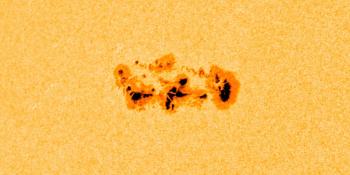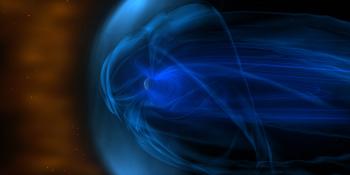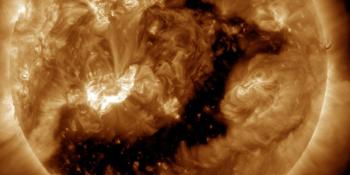Space Weather Forecast - Discussion
Issued: 2026 Feb 08 0030 UTC
Prepared by the U.S. Dept. of Commerce, NOAA, Space Weather Prediction Center and processed by SpaceWeatherLive.com
Solar activity
24 h Summary
Solar activity remained at low levels. The strongest flare of the period was a C7.3 at 07/0819 UTC from Region 4362 (S17W46, Dao/beta). Region 4366 (N14W46, Fkc/beta-gamma-delta) was the largest and most complex group on the disk. It produced the majority of the C-flare activity observed during the period and showed minor intermediate spot development. The remaining regions were mostly unchanged from the previous period. No Earth-directed CMEs were detected in available imagery.Forecast
M-class flares (R1-R2/Minor-Moderate) are expected, with a chance for X-class flares (R3/Strong or greater) over 08-10 Feb, primarily due to the eruptive potential of Region 4366.Energetic Particles
24 h Summary
The greater than 2 MeV electron flux reached high levels with a maximum flux of 2,062 pfu observed at 07/1855 UTC. The greater than 10 MeV proton flux remained at background levels throughout the period.Forecast
The greater than 2 MeV electron flux is expected to reach high levels on 08-10 Feb. There is a chance for the greater than 10 MeV proton flux to reach S1 (Minor) levels over 08-10 Feb due to the eruptive potential and location of Region 4366.Solar Wind
24 h Summary
Solar wind parameters remained mildly enhanced this period under negative polarity CH HSS influences. Total field strength values remained steady near 6-7 nT, with the Bz component ranging between +6 to -7 nT. Solar wind speeds gradually decreased from a peak near 550 km/s to about 450 km/s by the end of the period.Forecast
The solar wind environment is likely to observe an additional enhancement over 08-10 Feb with the anticipated arrival of a CME (from 03 Feb), combined with the onset of new negative polarity CH HSS influences.Geospace
24 h Summary
The geomagnetic field was at unsettled to active levels in response to negative polarity CH HSS influences.Forecast
Additional active periods are expected, with isolated periods of G1 (Minor) geomagnetic storming likely, on 08 Feb. Active levels are likely on 09 Feb due to the combined effects of the 03 Feb CME and the influence of the new negative polarity CH HSS. Quiet to unsettled levels are expected on 10 Feb due to negative polarity CH HSS effects.Latest news
Latest forum messages
AR4366 977Do the high-resolution sunspot counts point to more complex sunspots? 51Feb 8-9 CMEs 12AR 4371 19AR 4373 3
More topicsSupport SpaceWeatherLive.com!
A lot of people come to SpaceWeatherLive to follow the Solar activity or if there is a chance to see the aurora, but with more traffic comes higher costs to keep the servers online. If you like SpaceWeatherLive and want to support the project you can choose a subscription for an ad-free site or consider a donation. With your help we can keep SpaceWeatherLive online!
Space weather facts
| Last X-flare | 2026/02/04 | X4.3 |
| Last M-flare | 2026/02/05 | M1.1 |
| Last geomagnetic storm | 2026/02/05 | Kp5+ (G1) |
| Spotless days | |
|---|---|
| Last spotless day | 2022/06/08 |
| Monthly mean Sunspot Number | |
|---|---|
| January 2026 | 112.6 -11.4 |
| February 2026 | 137.7 +25.1 |
| Last 30 days | 126 +20.7 |





